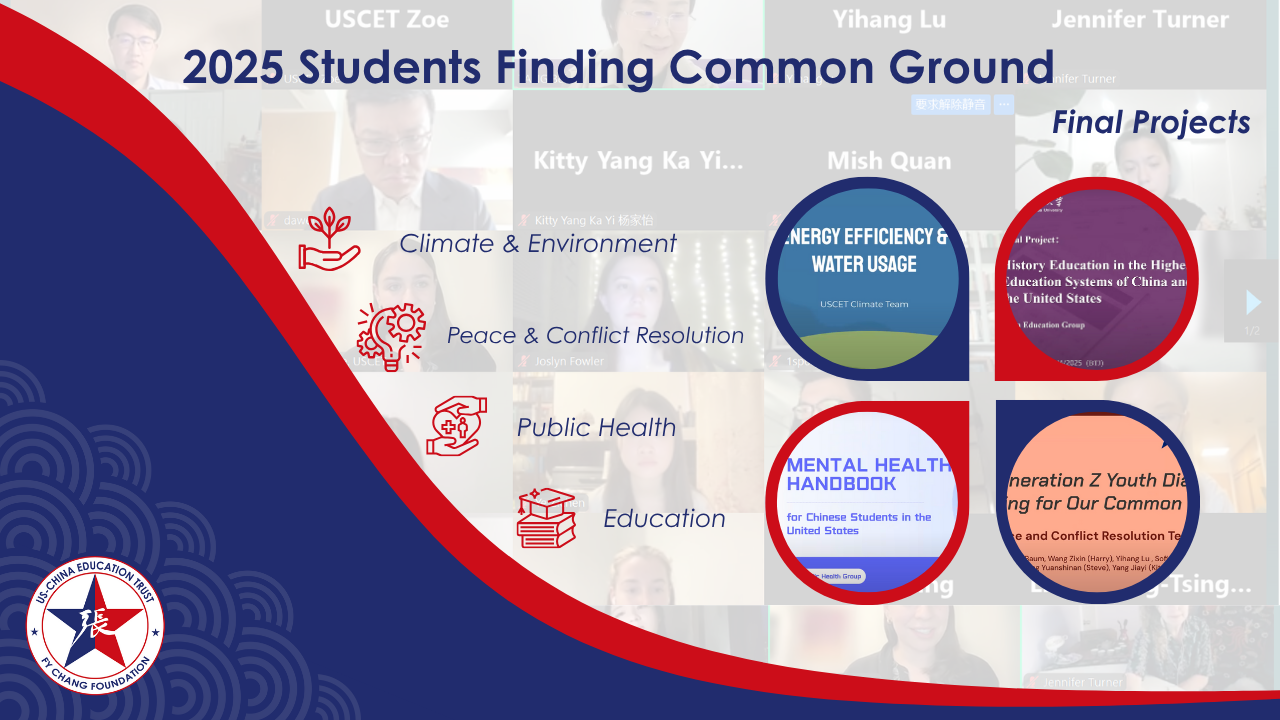

The US-China Education Trust has successfully concluded the 2025 Students Finding Common Ground program, which brought together American and Chinese students to explore pressing areas of collaboration amid ongoing strategic competition and tensions between the two countries.
Students Finding Common Ground—US-China Collaborative Projects in An Era of Strategic Competition engaged thirty-two students, selected through a competitive process, where half were enrolled in Chinese universities and half in American universities. Participants formed four groups of eight students, focusing on distinct thematic areas: 1) Climate and Environment, 2) Education, 3) Peace and Conflict Resolution, and 4) Public Health.
What the students have to say…
“I have learned how to efficiently manage a cross-cultural team by developing flexible communication strategies…transforming cultural diversity into an innovative advantage.” – Zecheng Tao, Public Health Group, Tsinghua University
“My biggest takeaway…was how powerful youth-driven, cross-cultural dialogue can be in building mutual understanding…I walked away with a deeper appreciation for the nuance in U.S.-China relations.” – Joslyn Fowler, Peace & Conflict Resolution Group, American University
“Even when the political climate is tense, it’s crucial to maintain strong relationship between two countries at the university level.” – Maisie Wang, Public Health Group, The College of William and Mary
“Stereotypes still exist… but small projects of cooperation can still make a difference when implemented on a larger scale.” – Xingyi Wang, Peace & Conflict Resolution Group, Tsinghua University
Following six months of collaborative research and dialogue, the groups are proud to present their final deliverables below:
1. Climate and Environment Group Project
This project addresses energy and water inefficiencies in universities across the U.S. and China by fostering collaboration between institutions and empowering student-led solutions. Through comparative research, surveys, and partnerships with sustainability experts, their project identifies systemic challenges such as fragmented policies and low awareness of green initiatives. The team proposes actionable strategies to enhance campus sustainability, including student workshops, cross-cultural pilot programs, and streamlined communications campaigns. The outcome includes a practical handbook to guide student-led efficiency efforts and policy frameworks to align institutional goals with grassroots action. By bridging gaps between awareness and practice, the project positions universities as models for scalable environmental stewardship, promoting global sustainability through academic leadership.
2. Education Group Project
This project compares history education in Chinese and American universities, analyzing how major historical events are taught and understood. Through surveys and literature reviews, the team identified narrative divides: U.S. curricula often emphasize global impact and heroism, while Chinese programs focus on national unity and policy. Their project advocates for cross-cultural integration by proposing joint curricula, interactive methods such as model diplomacy simulations, and social media campaigns to bridge perspectives. These strategies aim to cultivate youth equipped for nuanced engagements, capable of countering ethnocentric narratives and fostering bilateral epistemic reconciliation.
3. Peace and Conflict Resolution Group Project
The Peace and Conflict Resolution team initiated an approach to bridge divides between American and Chinese students by fostering dialogue on collaborative pathways to address the Russia-Ukraine war. Through joint interviews and consultations with peers and experts, the team identified shared priorities, such as economic interdependence and humanitarian cooperation, while navigating challenges like differing interpretations of key terms. The project underscores lessons on the necessity of sensitive communication, incremental trust-building, and amplifying underrepresented student voices in global peace efforts.
4. Public Health Group Project
The Public Health team addresses mental health challenges faced by Chinese students in the U.S., including culture shock, academic pressure, and social isolation. Through surveys and interviews, the team identified barriers like stigma, language gaps, and culturally mismatched resources. In response, this project delivers a practical handbook with tailored strategies, including task prioritization, structured routines, and community-building activities, alongside curated mental health tools, including apps, counseling services, and crisis support. Designed to empower students and adaptable for broader international audiences, the handbook promotes culturally sensitive approaches to well-being and resilience in academic settings.
